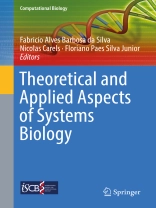This book presents the theoretical foundations of Systems Biology, as well as its application in studies on human hosts, pathogens and associated diseases.
This book presents several chapters written by renowned experts in the field. Some topics discussed in depth in this book include: computational modeling of multiresistant bacteria, systems biology of cancer, systems immunology, networks in systems biology.
Содержание
PART I — Fundamentals 1 Network Theory in Computational and Systems Biology: Concepts and Applications. Marcelo Ferreira da Costa Gomes, Bruna de Paula Fonseca e Fonseca, and Tatiana Martins Tilli.- 2 In Search of an Organizing Principle in Biology: Thermodynamic Functions and Cancer. Edward Rietman and Jack A. Tuszynski.- 3 Systems Immunology. Melissa Lever, Helder I Nakaya.- 4 Mathematics and Computation for Modelling Transcriptional Regulatory Networks. Marcelo Trindade dos Santos, Ana Paula Nascimento, Fabrício A. B. Silva.- 5 Bio-modeling using Petri nets: A computational approach. Rafael Viana de Carvalho and Fons J. Verbeek.- PART II — Applied Systems Biology 6 The challenge of translating system biology in precision medicine of cancer. Alessandra Conforde, Milena Magalhães, Tatiana Tilli, Fabrício Alves, Nicolas Carels.- 7 Computational modeling of multiresistant bacteria. Fabricio A. B. Silva, Thiago Merigueti, Thiago Giannini, Rafaela Brum, Ana Paula Nascimento, Kele Belloze, Floriano Silva, Rodolpho Albano, Marcelo Trindade dos Santos, Maria Clicia Castro, Márcio Argollo and Ana Paula D’A. Carvalho-Assef.- 8 Analysis Methods for Shotgun Metagenomics. Stephen Woloszynek, Gail Rosen, Zhengqiao Zhao, Dhantha Gunarathna , Alexandru Cristian, Joshua Chang Mell, Joshua P. Earl, Jacob Price, Christopher Sales.- 9 ANOCVA: a non-parametric statistical test to compare clustering structures. Alexandre Galvão Patriota, Davi Augusto Caetano de Jesus, and André Fujita.- 10 A path from specific enzyme to metabolic pathway modeling to access target relevance in molecular inhibitor development. Larissa Catharina Costa, Nicolas Carels, Marcio Argollo de Menezes.- 11 Mathematical-Computational Modeling in the Behavior Study of Neuronal Circuits of Repetitive Discharges. Maria Clicia Stelling de Castro, Dilson Silva, Celia Martins Cortez.- Index.
Об авторе
Prof. Dr. Fabrício Alves Barbosa da Silva is the PI of the research group on computational modeling of multidrug-resistant bacteria at FIOCRUZ. The research group on computational modeling of multidrug-resistant bacteria proposes the creation of innovative models, techniques and computational methods to identify new potential therapeutic targets in multidrug-resistant bacteria using a systems biology approach. This multidisciplinary group is composed of researchers from six different institutions in Brazil. Dr. Silva has expertise on computational biology, with focus on systems biology, mathematical modeling and the analysis and processing of large biological datasets.
Prof. Dr. Nicolas Carels is the coordinator of the Laboratory of Biological System Modeling (LMSB) from the Center for Technological Development in Health (CDTS) of Oswaldo Cruz Foundation. Since the 1990s, he accumulated expertise in the genetics, biotechnology and bioinformatics of plant systems. Morerecently due to the availability of high throughput datasets in the context of the post-genomics era, he dedicated his activities to the bioinformatics of diseases’ molecular networks in the context of translational medicine. He is also investigating the metagenomics of microbial communities in interaction with human protozoan parasites in invertebrate hosts.
Prof. Dr. Floriano Paes Silva Junior is the head of the Laboratory of Computational and Experimental Biochemistry of Drugs (La BECFar) at Oswaldo Cruz Institute, FIOCRUZ. Dr. Silva-Jr has expertise on Medicinal Chemistry and Chemical Biology working on the interface between computational and experimental approaches for drug discovery. His contributions include discovery and biochemical characterization of new drug targets and bioactive compounds with relevance to both infectious and non-communicable diseases.












